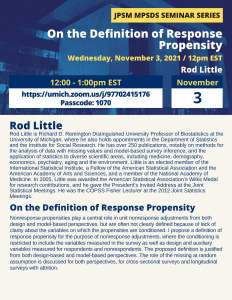Presented By: Michigan Program in Survey and Data Science
Rod Little - On the Definition of Response Propensity – MPSM JPSM Seminar Series
Michigan Program in Survey and Data Science and the Joint Program in Survey Methodology Seminar Series

Rod Little is Richard D. Remington Distinguished University Professor of Biostatistics at the University of Michigan, where he also holds appointments in the Department of Statistics and the Institute for Social Research. He has over 250 publications, notably on methods for the analysis of data with missing values and model-based survey inference, and the application of statistics to diverse scientific areas, including medicine, demography, economics, psychiatry, aging and the environment. Little is an elected member of the International Statistical Institute, a Fellow of the American Statistical Association and the American Academy of Arts and Sciences, and a member of the National Academy of Medicine. In 2005, Little was awarded the American Statistical Association’s Wilks Medal for research contributions, and he gave the President’s Invited Address at the Joint Statistical Meetings. He was the COPSS Fisher Lecturer at the 2012 Joint Statistics Meetings.
On the Definition of Response Propensity
Nonresponse propensities play a central role in unit nonresponse adjustments from both design and model-based perspectives, but are often not clearly defined because of lack of clarity about the variables on which the propensities are conditioned. I propose a definition of response propensity for the purpose of nonresponse adjustments, where the conditioning is restricted to include the variables measured in the survey as well as design and auxiliary variables measured for respondents and nonrespondents. The proposed definition is justified from both design-based and model-based perspectives. The role of the missing at random assumption is discussed for both perspectives, for cross-sectional surveys and longitudinal surveys with attrition.
On the Definition of Response Propensity
Nonresponse propensities play a central role in unit nonresponse adjustments from both design and model-based perspectives, but are often not clearly defined because of lack of clarity about the variables on which the propensities are conditioned. I propose a definition of response propensity for the purpose of nonresponse adjustments, where the conditioning is restricted to include the variables measured in the survey as well as design and auxiliary variables measured for respondents and nonrespondents. The proposed definition is justified from both design-based and model-based perspectives. The role of the missing at random assumption is discussed for both perspectives, for cross-sectional surveys and longitudinal surveys with attrition.